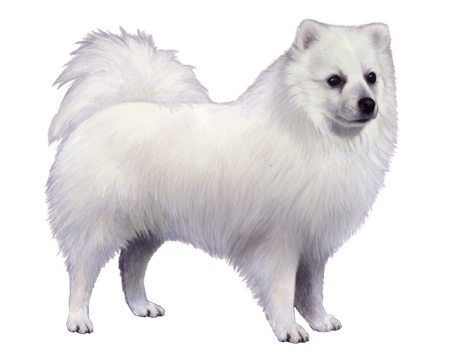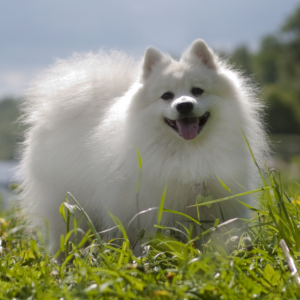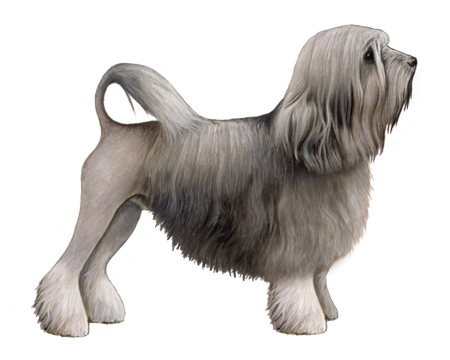
Japanese Spitz
Japanese Spitz are smart, affectionate lap dogs that want nothing more than to spend time with their families. Their good-natured, friendly personalities have made these energetic pups popular family pets.
Interested in discovering if your dog is a Japanese Spitz?
Check out Wisdom Panel's DNA tests.

Japanese Spitz Traits
General Appearance
Japanese Spitz are intelligent, cheerful, and keen with quick gaits. These small dogs have balanced bodies, pointed muzzles, and alert expressions that make them look fox-like.
Coat and Colouring
Like other spitz-type breeds, the Japanese Spitz has a double coat with a short, soft, dense undercoat and a straight outercoat that stands off of its body. Short hairs cover its face, ears, and parts of its legs. The rest of its body, especially the neck and shoulders, is covered with long hair, giving it the appearance of a mane. The Japanese Spitz has a long tail with profuse feathering. Its coat is pure white.
Distinctive Physical Traits
Japanese Spitz have pointed muzzles; triangular, pricked ears; small, round, black noses; and large, almond-shaped eyes with black rims. Their overall appearance is dignified and elegant.
Japanese Spitz Temperament
Japanese Spitz are eager to learn and love to please their families. They've earned a reputation for being natural comedians—and with the permanent grins on their faces, these dogs look like they're always having the time of their lives.
Japanese Spitz prefer being the center of attention in their families. They generally get along well with children and other pets but, due to their small size, require supervision when around small children or big dogs. This breed can be reserved (but never aggressive) with strangers. They love human companionship and would rather spend time with their people than almost anything else.
Japanese Spitz are alert and vigilant. They will bark to sound the alarm if anything seems amiss, but they are not overly vocal dogs and will do fine living in an apartment.


Japanese Spitz History
Records lost during World War II make it difficult to know how the Japanese Spitz got its start. The breed—which shares a similar appearance with the American Eskimo and Samoyed—might have descended from the German Spitz that arrived in Japan via Siberia and China.
Though first exhibited at a dog show in Tokyo in 1921, the Japanese Kennel Club didn't establish the breed standard until decades later. Japanese Spitz were imported from Canada, the United States, Australia, and China and crossbred to enhance the breed.
By 1950, these adorable little dogs had developed a significant following, becoming an in-demand breed in their native Japan and around the world.
Japanese Spitz Care
Nutrition
Feed Japanese Spitz a high-quality dog food that's appropriate for their age and breed size. To prevent them from becoming overweight, keep an eye on their food intake. Portion out their meals with a measuring cup to avoid over-feeding and limit treats to no more than 10% of their daily calories.
Grooming
Expect to brush Japanese Spitz regularly to maintain their coats. This breed sheds its thick undercoat twice a year. During these spring and fall "shedding seasons," they require extra brushing. The rest of the year, weekly brushing is sufficient. Avoid bathing Japanese Spitz too often because it can dry out their skin and strip it of natural (and beneficial) oils.
In addition to trimming their nails and cleaning their ears, start a regular dental care routine that includes at-home teeth brushing. Establishing these habits when Japanese Spitz are puppies is part of a lifelong commitment to good dental hygiene.
Exercise
One of the many great things about Japanese Spitz is their willingness to adapt to their environments. In apartments, a daily walk will do. But give Japanese Spitz more space, and they will happily roam. Keeping them on a leash in unfenced areas will keep them safe.
This outgoing breed appreciates interactive games like fetch, trips to the dog park, or other opportunities to be social. They may enjoy activities such as rally, flyball, and musical canine freestyle that take advantage of their natural desire to perform.
Japanese Spitz don't tolerate cold and may not want to spend a lot of time outdoors in chilly climates. These dogs believe that the best part of being active is the nap (preferably with their families) that comes afterward.
Training
Japanese Spitz's intelligence and eagerness to please make them an easy breed to train. They respond best to positive reinforcement and reward-based training. But for these pups, the best reward is spending time with their human companions, so look for opportunities for interactive training, such as competitive obedience.
Since Japanese Spitz can be anxious if left alone for long periods, training can help them become more confident. Socialization is also important for this outgoing breed. Group training classes to introduce them to unfamiliar people and animals are a good option.

Breed Group
Companion
This group consists of dogs typically bred for the specific purpose of human companionship, and many are popular pets because of their gentle nature. They became more common as the concept and luxury of dogs as pets prevailed.
Resources
https://www.akc.org/dog-breeds/japanese-spitz/
http://www.fci.be/Nomenclature/Standards/262g05-en.pdf
Reviewed 26 July 2020 by Annette Louviere, DVM



























_Color.png)




















